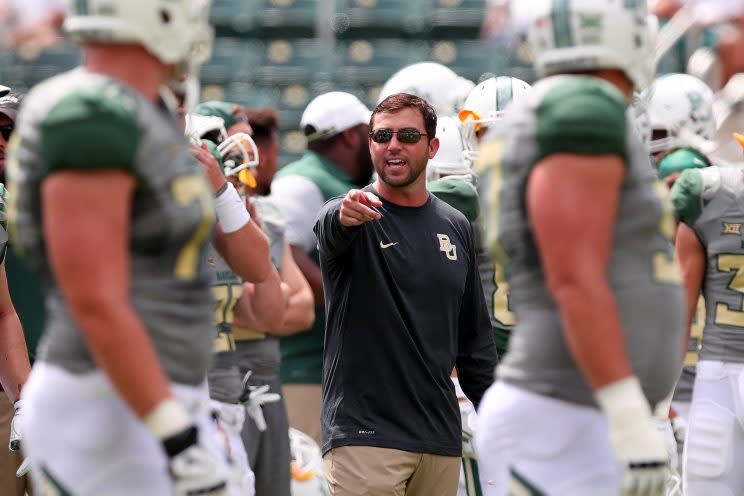Baylor football cited for recruiting violation

The NCAA Committee on Infractions issued a report Wednesday detailing prior rules violations committed by Baylor assistant football coaches Kendal Briles and Tate Wallis.
The report is unrelated to the sexual assault scandal that has enveloped the Bears football program in recent months, leading to wholesale changes in leadership of the school and its athletic department.
The school released the report to the public Wednesday. The NCAA found the Baylor staffers committed two Level II violations – Level I being the most serious and Level IV the least – but does not impose significant penalties beyond what was already levied by the institution.
Kendal Briles, son of then-head coach Art Briles, and Wallis were suspended by Baylor for one game in 2015 and prohibited from off-campus recruiting for 12 weeks after impermissible evaluations and contacts with prospects in the Dallas area. The two assistants attended track meets in order to “be seen” by two prospects, according to the NCAA report, but did not record their visits with the Baylor compliance office as evaluations of those prospects. The purpose was to avoid those visits counting against the overall number of in-person evaluations the staff could have with those players.
Baylor also discontinued football recruiting at track and field meets and stopped recruiting one of the two prospects for a period of eight weeks. The NCAA imposed an additional $5,000 fine and public reprimand and censure for Briles and Wallis.
The NCAA determined that Baylor’s attendance and interaction with recruits gave the program “more than a minimal advantage over institutions that were in compliance with NCAA recruiting legislation.”
But in applying few additional sanctions, the NCAA cited the following mitigating factors by Baylor: “Prompt acknowledgement and acceptance of responsibility and imposition of meaningful corrective measures and/or penalties; … (a)ffirmative steps to expedite final resolution of the matter; and … (e)stablished history of self-reporting Level III or secondary violations.”
The NCAA also credited Wallis with similarly prompt acknowledgement of his violations. However, the report said Kendal Briles had no such mitigating factors to his credit.
“[Briles] proposed that he was entitled to mitigating factor Bylaw 19.9.4-(b), prompt acknowledgement of the violation, similar to [Wallis]. However, [Wallis] admitted watching prospect 2 run immediately upon being asked. In contrast, [Briles] denied numerous times during his first interview that he watched prospects 1 and 2 run in any events. He claimed that he actively avoided watching them compete and that he turned his back to the track while they competed, which was not true. He admitted only to seeing them at the meets. He also claimed no recall of whether he observed prospect 2 compete in the long jump on April 16, 2015. He corrected his inaccurate statements by the end of the lengthy interview, but he was not ‘prompt’ in his acknowledgment of the violation. However, because he eventually was fully forthcoming in the interview, the panel … determines that the institution’s disciplinary actions toward him were sufficient and does not prescribe a show-cause order for his violation.”
Baylor issued a statement Wednesday from athletic director Mack Rhoades:
“Today’s announcement by the NCAA Committee on Infractions comes as a function of the NCAA legislated adjudication process in reconciling NCAA infractions. This isolated matter involving two assistant football coaches occurred during the spring 2015 recruiting evaluation period, and when notified of this issue in August 2015, Baylor immediately and effectively cooperated with the NCAA. We are grateful the NCAA Committee on Infractions accepted our original self-imposed penalties from September 2015. Baylor University accepts this outcome.
“Complying with NCAA regulation is a fundamental expectation of all Baylor coaches, staff, student-athletes and supporters. As President David Garland shared with the Committee on Infractions, we have tremendous confidence in our well-established compliance program, yet we will continue to place great emphasis on this expectation and hold those individuals accountable in circumstances where non-compliance occurs.”
A third Baylor assistant, Jeff Lebby, was found to have committed a Level III violation in 2015 for off-campus, in-person scouting when he spent part of the Tulsa-Oklahoma game on the Golden Hurricane sideline. This was a violation of NCAA rules regarding in-person scouting of a future opponent. Tulsa coach Philip Montgomery had previously worked with Lebby at Baylor and the two were friends. When Lebby was informed that his presence was a violation, he left the sideline and ultimately was suspended for a half when the Bears played Oklahoma last year.

